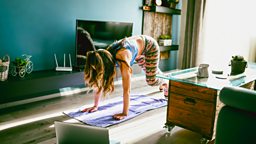10 tips for looking after yourself and being productive at home
Tackling the Coronavirus means that more of us than ever before are working from home, or confined indoors – with no clear end in sight. In the Don’t Tell Me the Score podcast, performance nutritionist James Collins shares a wealth of useful tips: from the importance of routine, to setting up your environment correctly, to how to fuel your day effectively.
1. Adjust your mindset and modify your goals
With so much uncertainty at present, James says it’s absolutely crucial to start with a positive mindset. We also need to readjust our aims and ambitions – our usual performance goals might be getting fitter, reducing body fat, or increasing energy levels, but the focus for all of us now is changing to self-development and wellbeing. This might be an outcome which is lost in the “daily office grind”, like exercising more or eating better. But there’s also the chance to develop a skill you’ve been putting off, like cooking, creative writing, or learning a new language.
2. Manage your environment
Before we establish a routine, we need to have a “revamp” of the home environment, says James. “Now, your home is also your office, which has lots of different challenges around it.” First, set up your physical workspace: make sure your screen is the right height, that you have a comfortable chair, and source a desk space away from family members or housemates.

James Collins has worked as a key member of Team GB at the Olympics, as Arsenal FC's head of nutrition, and with France’s World Cup-winning squad, top musicians and businesses – and he’s an expert in optimising performance.
-
![]()
Looking after yourself at home: James Collins
Strategies and tips for looking after yourself and being productive while staying at home with performance nutritionist James Collins. Listen and download the podcast now.
Discuss plans with significant others within the home – and constantly review how things are working. As a household, establish shifts for home-schooling duties or when to break for mealtimes. “If you’re now in the house, where do you make your phone calls?” If you’re sharing a room with others, these need to be scheduled in too. Have a noticeboard to record everything, and daily meetings to discuss the upcoming day. “By managing these expectations up front, we’re saving ourselves some stress down the line.”
3. Maintain a routine
“One of the things we know, from all the high-performing individuals around the world, is that routine is key,” says James. “Maintaining some element of routine at home is really important, for not just our productivity, but also our wellbeing and our mental health.”
James advises starting the day with a workout, or a walk around the block (if you’re still able to get outside). “Have a shower and get dressed, to make sure you’re in the right headspace to take on the day, especially if you’ve got work calls.” And divide your day up: “We know we’re most productive when we work in blocks and vary the activities.” Diarise virtual meetings, quiet time for more focused work, and don’t forget downtime: “Scheduling these regular breaks in a day are really important.” Crucially, establish when the working day will begin and end – so that office and homelife don’t begin to merge.

4. Have a weekly “check-in”
It may take time to find the right rhythm to the week – especially when sharing the house – so be prepared for challenges, says James, and plan a regular time to “check in” on you and your body, away from your family and work.
An energy deficit can reduce immunity.James Collins
“Ask yourself, ‘How do I feel? What are my energy levels like? What’s my sleep quality like? What’s my mood like?’” says James. This way you can assess progress, which wellbeing goals you need to work on, and how to refine your routine going forward. “Developing a routine or a plan here isn’t set in stone. By giving yourself 20 minutes each weekend to check in and reflect, you can keep improving and refining.”
5. Plan each meal plate
Nutrition is crucial for maintaining our immune systems but, with many supermarket shelves empty, planning meals can be challenging. Simply go back to basics, says James, and split each plate into thirds.
One third should be your maintenance foods: your protein. If chicken is your meat of choice but it isn’t available, look at different fish and pulses. “Being really versatile with these types of foods is key,” says the nutritionist. The second portion of your plate is your carbohydrates, or “fuel”. Ideally these should be fibrous, slow-releasing ones like brown rice, sweet potatoes, or whole-wheat pasta. And the final third is comprised of vegetables and fruit. These contain your micronutrients – vitamins, minerals and trace elements – and are really important for maintaining your immune system. “Then you’ve got a really balanced plate, and that’s a starting point.”
6. Practise flexible fuelling
There will be times when you’ll need to adapt how your plate looks. Less active days, when you’re stuck inside, require less fuel than those when you’re out and about or exercising. On these occasions you can have a greater portion of protein and mixed vegetables. However, don’t cut back on calories unnecessarily. “Now is not the time to go on an aggressive diet.” An energy deficit can reduce immunity.
7. Develop your chef skills
One benefit to being at home is the opportunity to try new recipes. “The two main barriers we have to engaging and building our recipe repertoires are time and confidence… so this is actually a nice place to start,” says James. Build up a small bank of recipes, which are quick and easy to prepare (under 20 minutes), and that require minimal ingredients. �鶹�� Good Food is an excellent free, online resource for this.
8. Have a daily dose of exercise

9. Recharge effectively
Working from home can make sleeping difficult, but it’s something we all need to prioritise. “Sleep affects every aspect of our biology,” says James. Not getting enough can effect decision-making, memory, pain-perception and, again, immunity. A shortage is bad news for your weight too – it can play havoc with your appetite hormones.
“Aim for seven hours or more of sleep a night”, and implement basic sleep hygiene rules: go to bed and wake at a similar time each day, sleep in a cool, dark room, and impose a screen-free winding-down period when you don’t scroll through emails or social media. Also, avoid inhibitors like caffeine, which steal your sleep. That extra cup might just be stopping you nodding off at night.
10. Share remotely
You might be used to having contact with your colleagues every day, so think about other ways you can share information with them, says James. Make it fun: circulate a “recipe of the week”, do a virtual Come Dine with Me, or send round a new workout. Linking up with team mates online and sharing progress can be great for morale.
Additionally, start online WhatsApp communities and stay in touch with the people who are important to you, James concludes: “Take the time, over FaceTime, to check in with friends, family and loved ones, and especially the people who live alone.”

Radio 4: Coping with self-isolation
-
![]()
Tips for parents coping with children at home
How to keep your children occupied and focussed when schools are shut.
-
![]()
What it's like using dating apps in self-isolation
How people are using dating apps in the time of Coronavirus.
-
![]()
How to make the most of your time at home
Sales of DIY goods have increased, as people are repairing, decorating and gardening.
-
![]()
Joe Wicks's tips for getting lean
The Body Coach shares his food and fitness insights with Simon Mundie of Don't Tell Me The Score.


























